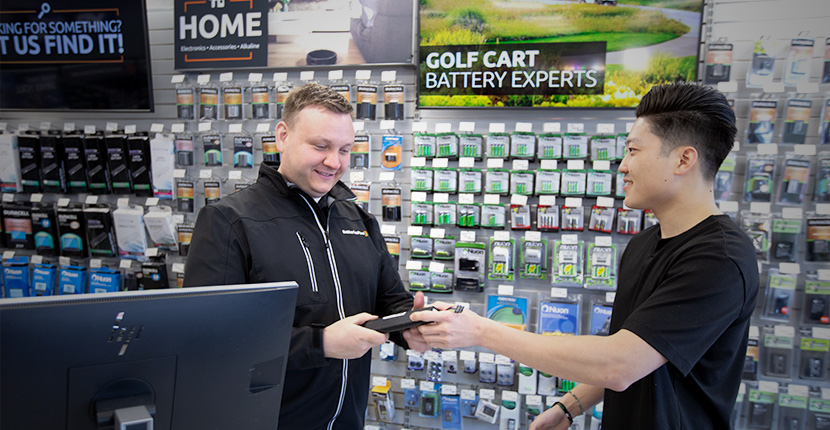Which Batteries are Recyclable?
- by Joe Weber - updated on 9/1/2023

You've just replaced your car battery all by yourself at home for the first time and pat yourself on the back for a job well done. You suddenly realize that you have no idea what to do with the old battery sitting on your garage floor. What do I do with the old battery? Can I throw it away? Is there somewhere that will recycle it? I have a drawer full of other old batteries, what do I do with those? Keep reading to discover all the ways you can dispose of batteries and which batteries must be recycled.
What Batteries Can I Recycle?
The quick answer to the first question is, no, you can't throw your car battery in the trash. In addition to car batteries, there are many batteries that are not only recyclable but have to be recycled by law. See below for information on which batteries are safe to throw away and which batteries need to be recycled.
Lead Batteries
Heavy lead batteries, like car batteries, boat batteries and smaller sealed lead acid batteries that are seen in security systems and backup units need to be recycled and are the only type of battery to have close to a 100% recycling rate in the United States. Other than environmental factors, like having to mine for new materials, recycling lead batteries is also cost-effective. Reclaimed lead from recycled batteries is used to manufacture new batteries.
Nickel-Cadmium Batteries
Nickel-cadmium batteries can pose a very serious threat to the environment and to the health of the public if not disposed of properly. If Cadmium is absorbed into the ground it is toxic to plants, animals and microorganisms. It also affects your kidneys, liver and bones and is also highly carcinogenic if inhaled. For the health and safety of the public and the environment, these batteries must be recycled or at a minimum taken to a hazardous waste disposal center.
Nickel-Metal-Hydride Batteries
While less toxic than nickel-cadmium, Nickel-Metal-Hydride is still harmful in large quantities, used NiMH batteries can be disposed of with household trash only when you are throwing away a small number of batteries. If you are disposing of 10 or more you should take them to a recycling center or hazardous waste disposal site to be properly recycled.
Primary Lithium Batteries
Lithium AA, AAA, 9V, etc. should never be tossed in your trash and should be recycled properly. Each battery should be placed in its own plastic bag or wrapped in tape to protect against batteries coming in contact with each other to prevent sparks. Single-use lithium batteries should never be placed in the trash or municipal recycling bins. The Environmental Protection Agency has great information on used household batteries and a search for a recycling center near you to recycle spent lithium batteries.
Lithium Batteries
Used in everything from cellphones to deep-cycle batteries, lithium is quickly becoming one of the most popular batteries in the market, the proportion of lithium batteries sent to landfills has increased greatly over the years. While intact lithium batteries are relatively harmless, the number of them being disposed of is a concern. Recycling lithium batteries is done more for environmental reasons than anything. After sitting in a landfill the product could start to break down and become toxic. Most of the time the recycling process for lithium batteries is covered by battery manufacturers so there is no reason for them to go to landfills.
Alkaline Batteries
Alkaline batteries like your everyday AAs and AAAs are approved for disposal in normal household waste in most states, but there are efforts to recycle them for environmental benefits. If you live or work in California or Vermont, you must recycle alkaline batteries and they cannot be thrown out in the normal trash. There are some cities that have their own local recycling regulations that also require the recycling of alkaline batteries. Check with your local municipality for recycling laws and recycling centers to see if they will accept alkaline batteries.
How Do I Dispose of Old Batteries?
As you learned above, many batteries need to be recycled for the health and safety of the public and the environment. Many local municipalities have recycling centers where you can take your spent batteries for proper disposal. Battery Council International has a great recycling resource to learn about how all the parts of lead batteries are recycled.
It's important to remember that even your normal everyday alkaline batteries like AAs and AAAs need to be recycled in many areas around the country. Please check with your local laws to make sure you dispose of all of your batteries properly.
Recycle Your Old Batteries and Light Bulbs at Batteries Plus
Do you have batteries lying around that need to be recycled? Stop into your local Batteries Plus store to see how we can help you. Batteries Plus is happy to help with your recycling needs. Visit our recycling page to see how we can help you with your recycling needs. Keep in mind that some items that we do accept come with a fee attached for proper disposal.
To learn more about recycling batteries and lightbulbs please read our blog articles titled "Recycle Your Old Batteries and Light Bulbs at Batteries Plus" and "How to Dispose of Car Batteries Safely".
Learn about the fascinating new recycling technology being used to recycle alkaline batteries in Europe in "Truth or Fiction: Alkaline Battery Plant Food".